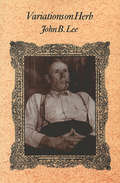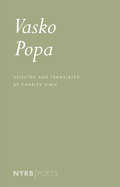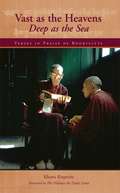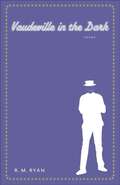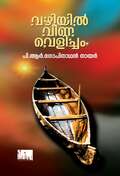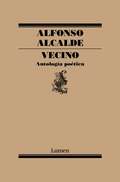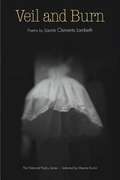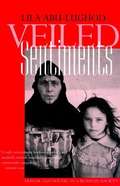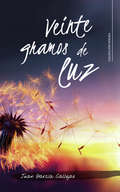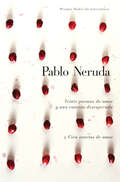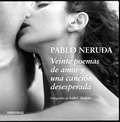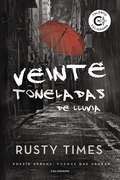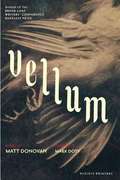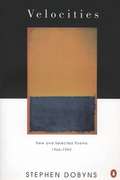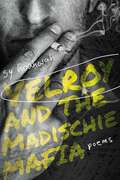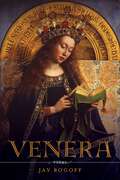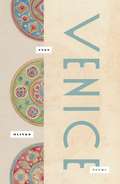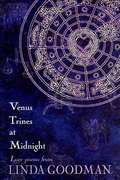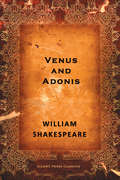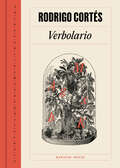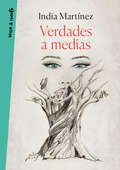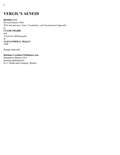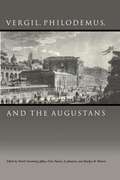- Table View
- List View
Variations on Herb
by John B. LeeWinner of the 1995 Milton Acorn Memorial People’s Poetry Prize Variations on Herb is the latest in a lengthening series of books that emanate from the south-western Ontario farm of John B. Lee's childhood. The focus of Variations is Herb Lee, John B's grandfather (and an absolutely unforgettable curmudgeon) but the background of rural Ontario is also made palpable entirely without indulgent explanation. This grain, this rich vein that appears in book after book, may well be inexhaustible; the cumulative effect certainly has few parallels in Canadian writing.
Vasko Popa
by Vasko PopaAn original collection of work by the great Serbian poet of the twentieth century.Vasko Popa is widely recognized as one of the great poets of the twentieth century, a riddling fabulist, whose work, taking its bearings from the songs and folklore of his native his Serbia and from surrealism, has a dark gnomic fatalistic humor and pathos that are like nothing else. Charles Simic, a master of contemporary American poetry, has been translating Popa’s work for more than a quarter century. This revised and greatly expanded edition of Simic’s Popa is a revelation.
Vast as the Heavens, Deep as the Sea
by His Holiness the Dalai Lama Gareth Sparham Khunu RinpocheRevered by many--especially His Holiness the Dalai Lama--as the very embodiment of altruism, the late Khunu Rinpoche Tenzin Gyaltsen devoted his life to the development of bodhicitta--the aspiration to achieve enlightenment for the sake of all sentient beings. Presented in both English and the original Tibetan, this modern classic is a collection of Khunu Rinpoche's inspirational verse.
Vaudeville in the Dark: Poems (Southern Literary Studies)
by R. M. RyanVaudeville in the Dark is R. M. Ryan’s dance to the music of our times, his search for salvation in poetry. In writing up our minor moments, he reckons to find “peace beneath the unsteady light / where we give ourselves to the world / as we circle in and out of the dark.” Sometimes funny, sometimes somber, the world of Vaudeville in the Dark ranges from an elegy on the death of a miner in Sago, West Virginia, to a meditation on the life of Rembrandt. Tony the Tiger, Glenn Gould, Chaucer---each has a moment as Ryan makes his way across the stage of our lives. He creates a world both frightening and funny as we—songsters all—long for a “heart dissolved in melody.”
Vazhiyil Veena Velicham: വഴിയില് വീണ വെളിച്ചം (സമ്പൂര്ണ കവിതാസമാഹാരം) മലയാളം
by P. R. Gopinathan Nairജീവിതത്തിന്റെ വഴിത്താരയില് വന്നു വീണ ഇരുളിനെ സര്ഗ്ഗാത്മകതയുടെ വെളിച്ചംകൊണ്ട് അതിവര്ത്തിച്ച പി.ആര്. ഗോപിനാഥന് നായരുടെ കവിതകളുടെ സമ്പൂര്ണ സമാഹാരം. കാലത്തോടു പ്രതികരിക്കുന്ന, ജീവിതപരിസരങ്ങളുടെ ചൂടും ചൂരും ആവാഹിച്ച സ്വത്വശക്തിയുള്ള രചനകള്. മലയാള കാവ്യപാരമ്പര്യത്തില് വേരോട്ടമുള്ള ഗ്രാമീണന്റെ ബലിഷ്ഠമായ ജീവിത ദര്ശനം അനുഭവത്തിന്റെ കയ്പുകളെ വാഗര്ത്ഥ രസവിദ്യകൊണ്ട് കവിതയുടെ അമൃതക്കനികളാക്കി മാറ്റിയിരിക്കുന്നു. - കെ.എസ്. രവികുമാര്
Vecino
by Alfonso AlcaldeUna amplia selección con lo mejor del destacado poeta Alfonso Alcalde. La figura de Alfonso Alcalde (1921-1992) es ya legendaria en la literatura chilena: admirada por figuras tan distintas como Neruda, Ángel Rama, José Miguel Varas o Bolaño, su obra es irreductible, de una variedad y una riqueza asombrosas. En su poesía combina magistralmente la distancia del observador con la calidez y la cercanía del habitante, del amigo. De ahí el título de esta antología, Vecino, que recoge una parte importante del que fue su gran proyecto poético, El panorama ante nosotros, publicado en 1969, así como una amplia selección de poemas de sus libros anteriores y posteriores. Las voces y los diálogos, la muerte y la imaginación, la risa y el llanto, la expresividad y la delicadeza, las tradiciones y la invención son conceptos que, sin agotarla, permiten dar señas del talante de esta poesía única, que desborda libertad y emoción.
Veil and Burn
by Laurie Clements LambethConcerned with physical experience, pain, and disability, Veil and Burn illuminates an intense desire to feel through the Other, embrace it, become it, and in the transformation, to understand the suffering body. In poems about animals, artifacts, and monsters, Lambeth displays a fascination for all bodies while exploring their pain, common fate, alienation, and abilities. Hovering between poem and prose fragment, between the self and fellow creatures, Laurie Clements Lambeth celebrates physical sensation, imbuing it with lyric shape, however broken, however imprisoned the shape may be.
Veiled Sentiments: Honor and Poetry in a Bedouin Society
by Lila Abu-LughodUpdated Edition With a New Preface Lila Abu-Lughod lived with a community of Bedouins in the Western Desert of Egypt for nearly two years, studying gender relations and the oral lyric poetry through which women and young men express personal feelings. The poems are haunting, the evocation of emotional life vivid. But her analysis also reveals how deeply implicated poetry and sentiment are in the play of power and the maintenance of a system of social hierarchy. What begins as a puzzle about a single poetic genre becomes a reflection on the politics of sentiment and the relationship between ideology and human experience.
Veinte gramos de luz
by Juan García CallejasLa luz es una llaga que no se cierra nunca... En este segundo poemario, después de Tierra escondida, Juan García Callejas nos desvela el valor irrenunciable de la poesía como recurso para alumbrar el discurrir de la existencia cotidiana. Inspirándose en una cita de Christian Bobin y en sintonía con el imaginario de Eloy Sánchez Rosillo, entre otros escritores que laten de forma implícita en su propuesta, nos confirma que la experiencia poética es un acceso posible, y necesario, a la certeza de que la luz pesa siempre más que la sombra. Veinte gramos de luz sigue siendo un canto confiado en que el deseo de ver hace posible el don de la iluminación.
Veinte poemas de amor y una cancion de desesperada y cien sonetos de amor
by Fundación Pablo NerudaPremio Nobel de Literatura “El más grande poeta del siglo xx en cualquier idioma”. —Gabriel García Márquez Un gran éxito desde el mismo momento de su publicación en 1924 cuando el autor contaba con tan solo diecinueve años, Veinte poemas de amor y una canción desesperada causó un fuerte revuelo en la conservadora sociedad chilena debido a su franco retrato de la relación del autor con dos mujeres. Se convirtió inmediatamente en una de las colecciones de poesía más leídas, estableciendo a Neruda como una de las más singulares voces de la poesía en español del siglo XX. Incluso leído hoy, sigue sorprendiendo por su sincera descripción del amor y el sexo. Tan pasional y hermosa como Veinte poemas de amor y una canción desesperada, Cien sonetos de amor incluye algunos de los más sensuales e intensos poemas de Pablo Neruda. Aunque publicada treinta y cinco años más tarde, retiene la ingenuidad y la intensa pasión del joven Neruda, mezclada con la sagaz mirada de un hombre que lo ha visto todo.
Veinte poemas de amor y una canción desesperada: Twenty Poems Of Love And One Song Of Desperation (Biblioteca Edaf Ser. #Vol. 4)
by Pablo NerudaUna de las obras más célebres del poeta Pablo Neruda. «Me gusta cuando callas porque estás como ausente.Distante y dolorosa como si hubieras muerto.Una palabra entonces, una sonrisa bastan.Y estoy alegre, alegre de que no sea cierto.» Reseña:«Neruda significa un hombre nuevo en la América, una sensibilidad con la cual abre todo capítulo emocional americano. Su alta categoría arranca de su rotunda diferenciación.»Gabriela Mistral
Veinte toneladas de lluvia
by Rusty TimesPoesía urbana, poemas que arañan. Poesía urbana, poemas que arañan. <P><P>Por estos poemas vagan amores muertos, perdedores sin esperanza, vagamundos, guerreras con causa, enamorados sin armadura, arañas en la nevera, tumbos, entrañas, oscuridad, alcohol, nostalgia, canciones, anarquía, rebeldes en la ciudad ... y veinte toneladas de lluvia que lo inundan todo. <P>Atraviesa los versos mientras escuchas a tu grupo de rock favorito.
Vellum
by Matt DonovanVellum, the exquisite debut collection from Matt Donovan, meditates on beauty, art, and the violence that is sometimes inherent in both. Here, he juxtaposes religious iconography with stories from history, biography, and personal narrative. In the poignant "Saint Catherine in an O," a knife bears unlikely duality-an object stirring with danger and grace. "A man plays slide guitar / with his pocketknife, accompanying the words of his songs-/ one about light, the Lord moving on water . . . / how blood, he knows, will make him whole. " In other poems, he reflects upon master artists, who captured similar themes in their art though in different mediums. Brimming with poems that are quietly powerful, Vellum marks the arrival of a commanding new voice.
Velocities: New and Selected Poems 1966-1992
by Stephen Dobyns"Stephen Dobyns is one of the very finest poets writing in America today. His poems are brave, ravenous, intensely moving, and utterly his own." - Thomas Lux
Velroy and the Madischie Mafia: Poems
by Sy HoahwahFrom the Comanche Tribal Housing of Madischie in southwestern Oklahoma comes a crew of young Comanche, Arapahoe, and Kiowa toughs hell-bent on gaining power within a subculture of organized crime. Led by a Comanche named Velroy, they find themselves caught in the century-long transformation from the old Comanche Nation to a modern-day casino-owning tribe. Hoahwah relays their story with a distinctive narrative flair, honed syntax, wild imagery, and a splash of lyricism.
Venera: Poems
by Jay RogoffPraise for Jay Rogoff"[Rogoff's] poetry takes a visible art of movement and translates the feelings it evokes and the history it records into delicate words.... But Rogoff also has an amazing knack for the humor in humanity, as a slew of death-defying poems demonstrates." -- Andrew Burstein, The Baton Rouge Advocate"Quite simply, I love the gravitational, poetic pull of Rogoff 's work." -- Renée E. D'Aoust, Notre Dame ReviewThe poems in Jay Rogoff's Venera explore varieties of love, both sacred and profane, by drawing from the natural world, personal intimacy, and the human imagination as evoked in biblical narratives and art. Rogoff reveals how devotion's many guises collide to startle us: a husband consoles his wife after she is awakened by an imaginary child, a man daydreams of his kindergarten crush, Abraham's fear of God perplexes his love for Isaac, and the Virgin Mary, stunned by the angel Gabriel's inhuman beauty, contemplates the decades of purity that stretch ahead.In Venera's title sonnet sequence, inspired by visions of the feminine depicted in the works of Renaissance painter Jan van Eyck, such collisions evolve into collusions. As Rogoff weds elevated language to plainspokenness and sets the erotic alongside the miraculous, the beloved accumulates many identities -- everyone's mother and everyone's daughter, the laboring handmaid and the Queen of heaven, the fertile field and the elusive bride. Rogoff's poems allow us to ponder the contradictory human concoctions of love, detailing how they drive us to venerate the sacred while also submitting to the power of the sensuous.
Venice: Poems
by Ange MlinkoAnge Mlinko alchemizes art and life into a dazzling collection of poetry in VeniceIn Venice, Ange Mlinko dissolves the boundaries between the sublime and the ordinary, the mythic and the rational, the past and the present. She sees a Roman tablet, scratched with Greek script, in the waxen wings of a bouffant bee, and she thinks of the abyss between two airport terminals when considering Rodin’s Gates of Hell. From Naples, Italy, to its sister city on the Gulf of Mexico, or at home, in the glow of a computer screen (“I worry / that Zoom is ruled by djinn / that filter out the wavelength of love / and so I wear my evil eye jewelry, // as you advised, against being too /much in view . . .”), Mlinko probes the etymologies and eccentricities of all she encounters. As Dan Chiasson wrote in The New Yorker, “Her extraordinary wit, monitoring its own excesses, is her compass.”On her travels, Mlinko scrapes at the patina of the past and considers the line between destruction and preservation. Sparking with wit and intelligence, the poet’s own lines break down and remake language, myth, and time. Mlinko is a poet of art and of life, and Venice is a sumptuous exploration of poetry’s capacity to capture the miracles and ironies of our times.
Venus Trines at Midnight
by Linda GoodmanLinda Goodman was born on an April day during a spring thunderstorm. In addition to her books on astrology, she published a book in 1990 called Croooerz, which is a brilliant, romantic, semi-autobiographical prose poem. Though she was the most highly-acclaimed astrology writer in the world, her greatest wish was to be known as a poet. With venus Trines at Midnight and the forthcoming Love Poems, she has made use of all her talents within the medium of poetry. And she hopes that people will enjoy these insightful poems and will remember her secret wish.
Venus and Adonis
by William ShakespeareAdonis tragically chooses the excitement of the hunt over the charms of the beautiful Venus.
Verbolario
by Rodrigo CortésRodrigo Cortés regresa a las librerías con Verbolario: diccionario satírico, humorístico y poético, que, con sus más de dos mil definiciones y siete años de trabajo a la espalda, se atreve a enmendarle la plana al diccionario. «Verbolario es un milagro sostenido».Manuel Jabois Toda palabra tiene su significado oculto —su significado verdadero— acechante entre sus pliegues con la astucia del salteador de caminos; se desvela sólo con el uso y sólo ante la perspicacia y el oído, que son el mismo sentido. Rodrigo Cortés reinventa el lenguaje y hace confesar a cada voz su auténtico propósito. Verbolario no define las palabras: las desnuda. La crítica ha dicho:«Selvático y misterioso antidiccionario en que las palabras vuelven a ser territorios a la espera de ser explorados».Laura Fernández «Verbolario es el saloncillo antes de la obra, los camerinos llenos de secretos del diccionario».José Luis Garci «Cortés desvela una realidad que nadie había visto en el lenguaje: las palabras también juegan con nosotros».Jesús García Calero, ABC Cultural «¿Puede un libro ser a la vez diccionario, manual de humor, tratado filosófico y poemario? En manos de Rodrigo Cortés puede».Juan Gómez-Jurado «Con talento y picardía, Rodrigo Cortés logra ponerle a cada palabra de este Verbolario la espina precisa para que el pinchazo nos resulte puñeteramente gozoso».Fernando Aramburu «Enciclopedia ilustrada que mira el mundo con la sabiduría del viejo y la inocencia del niño».Ana Iris Simón «Carcajadas, sonrisas y la leve incomodidad que produce la verdad cuando anda desnuda».Sergio del Molino
Verdades a medias
by India MartínezLa gran artista India Martínez nos muestra en su primer libro sus emociones más íntimas a través un precioso conjunto de textos relatados con sensibilidad y emoción y acompañados de sus propias ilustraciones. «La verdad es muy subjetiva, depende de la piel que la percibe». Bellamente ilustrado por la propia artista, Verdades a medias es una colección de textos poéticos y dibujos en los que la cantante India Martínez indaga en lo más profundo de sí misma y de sus vivencias, transportándonos a su universo más personal. Nostalgia, dolor, amor, fantasía y hondura llenan las páginas de esta declaración de intenciones, de esta rasgadura de alma de la artista, que se desnuda de canción para vestirse de letras y ofrecernos su faceta más transparente y cercana. «Iré dando una de cal y otra arena. Una de voz y otra de música, una de India y otra de Jenny».
Vergil's Aeneid: Selected Readings From Books 1, 2, 4, And 6
by Vergil Barbara Weiden Boyd Bridget Buchholz D. Scott Van HornNIMAC-sourced textbook
Vergil, Philodemus, and the Augustans
by Jeffrey Fish David ArmstrongThe Epicurean teacher and poet Philodemus of Gadara (c. 110-c. 40/35 BC) exercised significant literary and philosophical influence on Roman writers of the Augustan Age, most notably the poets Vergil and Horace. <P><P>Yet a modern appreciation for Philodemus' place in Roman intellectual history has had to wait on the decipherment of the charred remains of Philodemus' library, which was buried in Herculaneum by the eruption of Vesuvius in 79 AD. As improved texts and translations of Philodemus' writings have become available since the 1970s, scholars have taken a keen interest in his relations with leading Latin poets.
